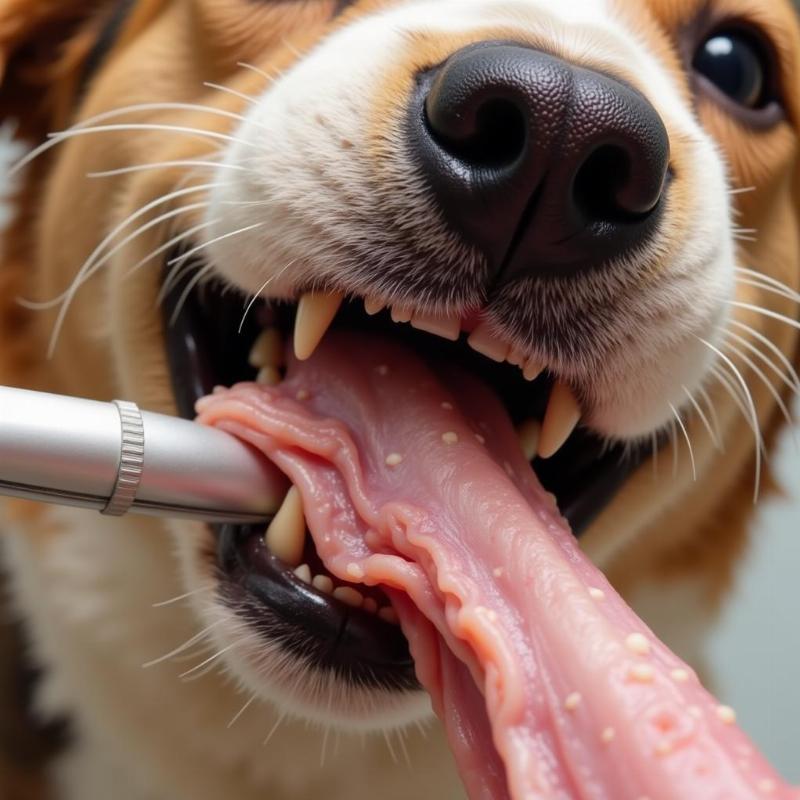Raw turkey necks are a popular chew treat for dogs, but their safety is a common concern for pet owners. Can my dog have raw turkey necks without any health risks? Let’s explore the potential benefits and dangers of feeding raw turkey necks to your furry friend, providing you with the information you need to make an informed decision. We’ll cover safe handling practices, potential choking hazards, and nutritional considerations specific to dogs in the US.
The Benefits and Risks of Raw Turkey Necks for Dogs
While raw turkey necks can offer certain benefits, like providing a good source of calcium and glucosamine, which can support joint health, it’s crucial to understand the potential risks associated with feeding them raw. The primary concern is the risk of bacterial contamination, particularly Salmonella and Campylobacter, which can affect both dogs and humans.
Furthermore, raw bones, especially if splintered, can pose a choking hazard or cause internal injuries such as punctures or blockages in the digestive tract. bones for dog teeth cleaning offer a safer alternative for dental health. For dogs who enjoy raw food, commercially prepared frozen raw venison dog food can be a safer option, as it adheres to strict safety and nutritional standards.
Safe Handling Practices for Raw Turkey Necks
If you decide to feed your dog raw turkey necks, it’s essential to follow strict hygiene practices. Wash your hands thoroughly with soap and water after handling raw poultry, and sanitize all surfaces that come into contact with the raw meat. Store raw turkey necks properly in the refrigerator or freezer to minimize bacterial growth.
Are Raw Turkey Necks Good for My Dog’s Teeth?
Raw turkey necks can provide some teeth cleaning benefits due to their abrasive texture. The chewing action can help scrape away plaque and tartar buildup. However, the risks associated with bacterial contamination and bone splinters outweigh the dental benefits.
 Close-up of a dog's teeth gripping a raw turkey neck
Close-up of a dog's teeth gripping a raw turkey neck
Safer alternatives for maintaining your dog’s dental health include dental chews, toothbrushes, and regular veterinary cleanings. Consult your veterinarian for personalized recommendations. They may also have advice on is bull pizzle good for dogs as an alternative chew treat.
Alternatives to Raw Turkey Necks
Several safer alternatives to raw turkey necks can provide similar benefits without the same risks. Cooked turkey necks, without the bones, are a good source of protein and can be given in moderation. You can also find a variety of commercially available dog chews designed to promote dental health and satisfy your dog’s chewing instincts. For a nutritious bone broth option, check out this guide on how to make turkey bone broth for dogs. It’s a delicious and safe treat!
Can Dogs Eat Smoked Turkey Necks?
While smoked turkey necks may be appealing, they are not recommended for dogs. The smoking process often adds salt, sugar, and other seasonings that can be harmful to dogs. can dogs eat smoked turkey necks explores this topic in more detail.
Conclusion
While raw turkey necks can offer some benefits for dogs, the risks associated with bacterial contamination and bone splinters should not be overlooked. Prioritize your dog’s safety by choosing safer alternatives, practicing diligent hygiene, and consulting with your veterinarian before introducing any new food into your dog’s diet, including raw turkey necks.
FAQ
- Can puppies have raw turkey necks? Puppies are even more susceptible to bacterial infections and choking hazards, so it’s best to avoid raw turkey necks for puppies.
- What should I do if my dog chokes on a raw turkey neck? Seek immediate veterinary attention if your dog exhibits signs of choking or distress.
- Are there any dog breeds that should absolutely not have raw turkey necks? Smaller breeds and those with sensitive stomachs are particularly vulnerable to the risks associated with raw turkey necks.
- How can I tell if a raw turkey neck is contaminated? Visual inspection alone cannot determine if a raw turkey neck is contaminated. Proper handling and storage are crucial, but there’s always a risk.
- What are some signs of bacterial infection in dogs after consuming raw meat? Vomiting, diarrhea, lethargy, and fever can be signs of a bacterial infection.
- Are cooked turkey bones safe for dogs? No, cooked turkey bones are brittle and can easily splinter, posing a significant choking hazard.
- What are some healthy, safe chews for my dog? Dental chews, bully sticks, and certain types of rawhide (under supervision) can be safer alternatives.
Beautdogs.us is your premier destination for comprehensive and reliable information on dog care and companionship in the US. We provide expert advice on dog breeds, nutrition, training, and overall wellness. Whether you’re a seasoned dog owner or just starting your journey, Beautdogs.us offers valuable insights and resources to help you provide the best possible care for your furry friend. Connect with us for personalized guidance: Email: [email protected], Phone: +1 501-555-7529.